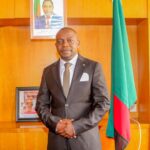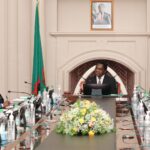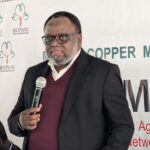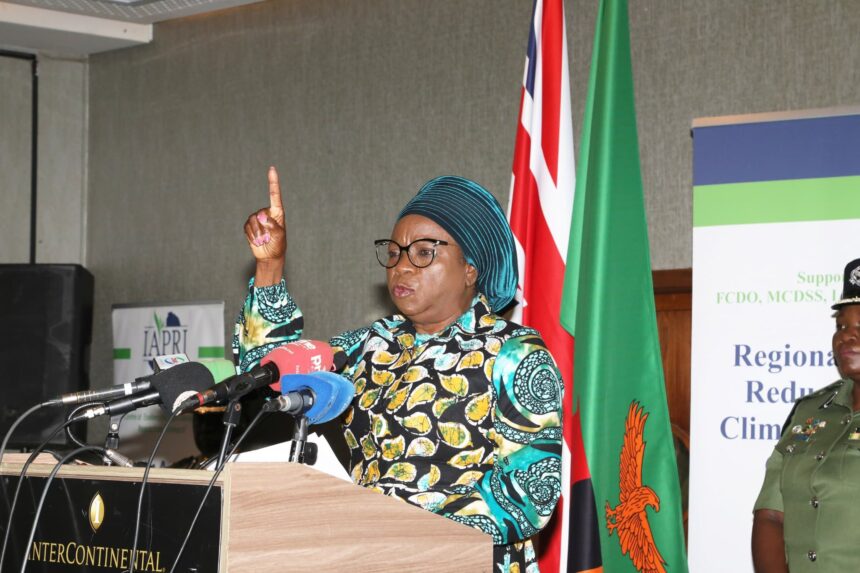At the opening of the Lusaka Conference on Poverty Reduction and Climate Resilience, Zambia’s Vice President Dr. W.K. Mutale-Nalumango delivered a powerful and emotionally charged keynote address that struck at the heart of the nation’s developmental challenges. With honest reflection and bold questions, Dr. Mutale-Nalumango challenged the country to re-examine the true drivers behind persistent poverty, despite decades of political change.
Speaking with evident passion, the Vice President remarked, “We have been changing governments since independence, changing Presidents and political players, yet still remain poor. The question is: Is this really a political issue, mindset issue or policy issue?”
Her words echoed deeply across the conference hall, setting the tone for what promises to be a transformative dialogue around poverty alleviation and climate resilience in Zambia.
Beyond Politics: A Call for Deeper Change
Dr. Mutale-Nalumango’s message was clear: simply rotating political leadership will not solve Zambia’s entrenched poverty. Without changing how we think, how we govern, and how we implement long-term policy strategies, real progress will remain elusive.
“You can decide to throw us out of government tomorrow but still remain poor,” she said. “If you don’t strengthen strong policy response towards poverty reduction,” the problem will persist.
This candid statement challenges Zambians—from citizens to lawmakers—to look beyond political cycles and focus instead on consistent, coherent, and data-driven policymaking. It also draws attention to the importance of institutional capacity, political will, and professional competence in executing development goals.
Poverty and Climate Resilience: A Shared Fight
The Lusaka Conference comes at a critical time when Zambia, like many other African nations, is battling the dual threats of poverty and climate change. Rural communities continue to suffer from food insecurity, limited infrastructure, and the devastating impacts of droughts and floods exacerbated by global warming.
Climate resilience and poverty reduction are deeply interconnected. Poor communities are the most vulnerable to climate shocks, and without adequate adaptation strategies, the risk of deepening poverty grows. Dr. Mutale-Nalumango’s address underscored the urgent need for multi-sectoral policies that address both challenges holistically.
She emphasized the need for bold, adaptive approaches that center local knowledge, sustainable agriculture, inclusive economic growth, and the protection of Zambia’s natural environment. “This is not a time for politics as usual,” she implied, “but for transformative thinking and results-oriented action.”
The Need for Professionalism in Governance
Perhaps one of the most resonant parts of her speech was the assertion that Zambia needs “more determined professional workers than any crop of political players.” This statement underlines the critical role of a skilled, ethical, and motivated workforce in driving national development.
From public service delivery to climate-smart infrastructure and social protection, Zambia’s ability to lift its people out of poverty will depend not just on policy frameworks, but on the people who implement them. Investing in education, capacity-building, and leadership development will be key to ensuring that policy does not merely exist on paper, but produces real, measurable outcomes.
Charting a New Path Forward
The Vice President’s address sparked an important conversation about where Zambia goes from here. While political leadership remains important, the fight against poverty and climate vulnerability requires deeper systemic reform. Strong policies must be backed by strong institutions, and strong institutions must be staffed by capable, professional individuals who are committed to Zambia’s long-term development.
As the Lusaka Conference continues, stakeholders from government, civil society, academia, and international partners will have the opportunity to engage in solutions-focused discussions. But the bar has been set: cosmetic changes will not suffice.
Dr. Mutale-Nalumango’s challenge is not just to policymakers, but to all Zambians. The future depends on collective resolve, bold rethinking, and a shared commitment to break the cycles of poverty once and for all.
The keynote address by Vice President Dr. W.K. Mutale-Nalumango at the Lusaka Conference on Poverty Reduction and Climate Resilience was more than a political speech—it was a call to action. A challenge to move beyond superficial changes and engage in meaningful, long-term reform.
Her words are a timely reminder that true development requires more than leadership rotation. It demands visionary policy, a transformative mindset, and unwavering professionalism. For Zambia to rise, all citizens must rise to the occasion.






